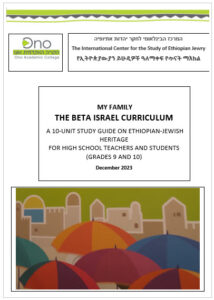MY FAMILY
THE BETA ISRAEL CURRICULUM

THE GOODNESS OF HUMANITY
Students should now be asked to read the following paragraphs:
When reflecting on the hardships that afflicted the Beta Israel in Ethiopia, such as persecution and famine, one might imagine that this community would have developed a sense of distrust or even cynicism toward other human beings. Yet this most certainly was not the case.
Many Jewish communities worldwide, along with other oppressed minority groups, indeed developed a prevailing attitude of suspicion51 toward humanity, in which they considered anyone outside their own community to be untrustworthy52 and unreliable. This attitude emerged in response to the very real chances of danger, and improper53 behavior, that faced these persecuted communities for so long.
The Beta Israel community, however, maintained as one of its core values the idea that even when people sin, humanity is still broadly and inherently good54 – trustworthy, and reliable.55 As Rabbi Dr. Sharon Shalom explains: “I have a tradition from my grandfather… that at the foundation of the theological conception of the Beta Israel is the idea that a person’s heart is good by its nature. This is because the sages of the community believe that it is not possible that a person’s nature is evil at its core, for humanity was created in the image of G-d, and G-d is good. How could a wholly good G-d create a man who is evil at his core?”56
Having read this, students should be asked to consider how the Beta Israel’s emphasis on the “goodness of humanity” might influence their interactions with others. To that regard, how might a conversation with a member of the Beta Israel differ from a conversation with a Jew from another community?
51 As Rabbi Dr. Shalom explains, the Beta Israel consider the idea “suspicion” and what it represents to be “a foreign word” (From Sinai to Ethiopia, p. 142).
52 In the aftermath of the flood that destroyed all of humanity aside from Noah and his family, G-d mused how “the desire of the heart of mankind is evil from his youth (Bereishit 8:21), and, in this spirit, the rabbis understood that “humanity is always presumed to be a [physical and spiritual] danger to others” (Mishnah Bava Kamma 2:6).
53 As evident in the various Talmudic laws of חשד and עיו מראית.
54 Shalom, “The Encounter Between Two Opposing Worldviews in Jewish Philosophy,” p. 672.
55 See Rabbi Sharon Shalom, Sichot Al Ahava V’Pachad (Dialogues of Love and Fear), Hebrew, p. 182.
56 See Rabbi Sharon Shaloms, Dialogues of Love and Fear, English (Maggid, 2022).







